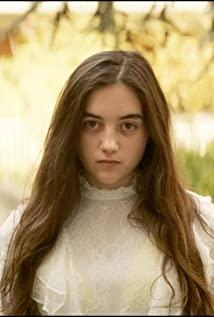They look at each other across the bonfire, they test, they laugh, they lose their minds across the bonfire.
A cappella jumping with the flames, "Non possum fugere" faster and faster (they can't escape)
She knows that she can't escape, she can only revolve around life in circles, she can't step into this fire, anyone will pull her out, not even her.
"Portrait of a Burning Woman" uses honorifics throughout. The young lady talks to her female companion, and the daughter talks to her mother. Even in summer, even when the emotions are raging, it's just Marianne smearing an unspeakable herb under her armpit and teasing it with her fingers. The pages of the book are generally obscure expressions, and what they convey is the suppressed voice. So Marianne didn't know when Loiz wanted to kiss her for the first time. She always thought it was the Eden-like island mansion after Loiz's mother left that gave birth to the relationship.
But think about it, this moment should have come sooner. When Marianne was still painting quietly at night in front of her companions during the day, she switched her identities inside and outside the curtain, always on guard against Loiz's gaze when she found that her intentions were naturally indifferent. She played the unfamiliar "Four Seasons" intently, glanced at Loiz while introducing the movement, and even forgot the score after a few short paragraphs, but Loiz beside her nodded and stared at her, a light-colored Her eyes were full of Marianne's red dress. Loiz, who had only been on the island for a few weeks after coming out of the church, had never heard string music. Marianne was undoubtedly the female companion who opened up her world and marked her with footnotes everywhere. Which four seasons I have gone through in the past are more unforgettable.
That's why Loiz, who returned from a solo trip that afternoon, said to Marianne in dismay: "When I'm alone, I feel the freedom you speak of, but at the same time I miss you."
Parting is approaching, but what Loiz is waiting for is Marianne's confession. Marianne accompanies her to the beach every day for a walk in the wind and tries to keep up with her footsteps. Listening to her own gossip and gossip blowing through the cave with the sea breeze is just to see clearly own face, see the light and shadow structure on the face. It's not that she didn't have doubts, she could hear Marianne's apprehension when she said that she could draw, but she happened to see the mirror placed in front of the fitting stool. She was just reluctant to place any doubts.
Loiz's sadness and the words spit out by the feeling of being deceived are a lot of helplessness, "Now I know why you always say get out of here, you have the same guilt as everyone else." You are just passing through like everyone else. My life, I didn't intend to test it, but let me tell it all. Loiz, who finally got into the water, didn't know whether he could swim or not until he came ashore, because I also don't know if I am half like me in your eyes.
Until I see my lifeless self under the rules, routines, and inspiration, the strong feeling of being deceived finally overwhelms all other emotions, you make up me with countless fleeting moments, and I don't let me unload my heart for you. Prevent me in the future. The few days of conversation and closeness turned out to be just talking to themselves, each taking what they needed, and it was so far away that it seemed that they didn’t know each other at all.
But when she heard her mother taunting Marianne, she still stood up for her, after all, she still loved her.
Marianne a few days ago may have been so busy covering up some reality that she didn't find some of her emotions being covered up. Once she confessed her identity, she found that she would not miss any of Loiz's subtle actions, Loiz's quietness and childishness when she fell asleep in the kitchen, her hands and the inadvertent twitching of the corners of her mouth when she was deliberately indifferent. For a painter, she has long been in love with her work. In the candlelight of the dark night, Loiz, who woke up, forgot his usual cover-up and just smiled mischievously, with endless tenderness in the corners of his eyes. It seems that in the dark night, the viewers always feel the indescribable dull fire.
The lightless fire was hidden in the ashes until the bonfire ignited the ashes too. The unparalleled, bright white and bright red shone on her face—that was the sky she admired, and there, Yiren's starry eyes, bright like the silver stars of the heaven, paid tribute to her allegiance with the soft brilliance of ice and jade.
In the daytime, the coastline is less sheltered. They intertwined their hands and removed the veil from the wind behind the reef. The love between the painter and the model sizing and observing each other stopped in hugs and whispers. No one wants to be Tarquin, go to Fort Kolatin to hold Lucrece.
The second portrait was also completed. Anyway, this painting will take Loiz away, and it doesn't matter if it is touched or not, just stop the brush and it means it's finished. The two were silent and lost. The younger Loiz still has a lot of unwillingness, unwilling that their relationship is only five days after the mother left. They quarreled, questioned each other for not being brave, and blamed each other for not backing them up to take risks. But what about adventure? Can really defend affectionateness? Marianne may have nothing to worry about, but she doesn't want to let her heart bet on Loiz's reputation. The outcome of the adventure, you and I both know, is doomed.
Many years later, Marianne sent Orpheus to the exhibition in her father's name, and the picture depicts neither the scene before Orpheus turns nor the scene where Orpheus turns Eurydice and then goes to the underworld. The two of them had a chance to say goodbye, and she always remembered the corridor at that moment, one was Orpheus who made a poetic choice, and the other was Eurydice who called his love back.
Perhaps when they read the story that night, the two knew that the ending could not be modified. Only Sophie, the maid, rebuked Orpheus for being unreliable from the perspective of responsibility and perseverance. Sophie did not understand the unease and panic when Orpheus was leading the way alone:
Sometimes he felt in a trance that he had caught
Footsteps behind, two people behind
Also on the long way home.
But that's just the sound of my own footsteps
Echoes, or the whistling of the wind in the placket.
It was impossible for them not to follow him, he said to himself;
His loud voice faded away into the distance.
Impossible not to follow him. However, their steps
But it frightened him lightly.
At this moment, Eurydice has suffered too much love, and Orpheus' harp has called her a world that is too sad. Eurydice's footsteps became lighter and lighter, but she showed that she was not moved by this love. She was a sweet fruit full of death, surprisingly gentle. Death as a new experience had completely cut her off from Orpheus. Even if he walked out of the underworld all the way, Eurydice might not belong to Orpheus again.
So, Marianne makes the same poetic choice as in Rilke's poem.
Loiz, who was reading the story, was speaking from Eurydice's point of view, the character who had never been neglected. Perhaps Eurydice couldn't bear Orpheus' sacrifice for love, or she needed peace without memory. , because in the transparent house Orpheus is a phantom, exists, and Eurydice has truly died, she said, "Go back", she knew the end, thought about goodbye, and prepared all the way For a long time, like Tsvetaeva who has been waiting for the tip of a knife for a long time, she has waited for this long and long farewell.
After all, no matter who thought first, their love couldn't make them strangers on the long road.
The story of old wine and new wine has been poured into countless cups since Roman times and appeared in the works of many poets. However, Eurydice is mostly background in poetry, and it is only in Rilke's poetry that thoughts begin to emerge. In Rilke's works, love is a kind of metaphysical existence, and he wants to go beyond love to reach a kind of "survival transcendence". Of course, his detachment made Tsvetaeva a little dissatisfied. Coincidentally, Tsvetaeva also wrote this story, and Eurydice in the poem looks inward, meets the tip of the knife, and says only to Orpheus, "You must forget, leave this!" The two poets are also lovers. Marianne and Loiz also spoke about the perspectives of the two poets, respectively.
Later, although Marian and Loiz still lived in the same world, they lived very far away. Marianne saw Loiz again. In the concert hall, she was in tears listening to the "Four Seasons" that Marianne had stumbled upon, another tearjerking long shot. Whether or not the tears blurred the sight of the seemingly detached Marianne, all Eurydice wanted to say to Orpheus was on page 28.
View more about Portrait of a Lady on Fire reviews











